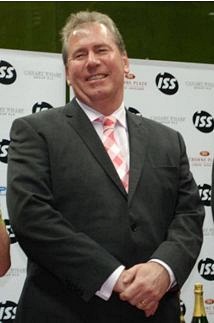
A collaborative squash novel featuring eleven writers.
BREAKING GLASS
Chapter ONE BY Alan Thatcher
Chaos.
Total chaos. Tournament promoter John Allenby was screaming down the
phone, his voice echoing around his temporary office in a hotel room
opposite Copacabana Beach.His two assistants kept their heads down as his anger reached boiling point.
The squash impresario had gambled on bringing a major tournament to Rio, setting up the all-glass court on the beach ahead of the 2016 Olympic Games.
With squash having won a deserved place in the 2020 Olympics, he wanted to showcase the sport as a dynamic, athletic entertainment. With Olympic status, squash was ripe for development.
With extra funding rolling into the sport on the back of that crucial vote in Buenos Aires in September 2013, when squash had beaten six other sports to gain a place at sport’s top table, Allenby was confident he could crack it.
Everything was going to be bigger.
Bigger venues, bigger ticket revenues, bigger sponsorship and bigger TV exposure.
He had booked the TV production team, who had flown over from London, and he had arranged for 1,000 seats to be erected on all four sides of the glass court which by now should be sparkling in the afternoon sunlight on the opposite side of the road.
Only there was no court, and, until it arrived, no likelihood of the tournament taking place to showcase squash’s hard-won place in the 2020 Games.
“Fuck. Double fuck.”
He slammed down the phone, hurled his notebook across the room and cursed again.
Try as he might, Allenby was unable to secure the release of the glass court from the dockside, despite its arrival from the States ten days earlier.
The American, who had built up an event series in Europe and the States, was regarded in the sport as a top pro, a great organiser and a master of the small print in any contract.
But this was one crisis he had failed to foresee.
Persuading the customs office to release the container that held the glass panels and lighting rig was proving impossible. Calls to the city mayor’s office, and even the country’s sports minister, had failed to register any response.
With two days to go before the tournament was due to start, he was running out of options.
He had done well to find a list of sponsors who had shared his vision of a sporting spectacle on the world’s most famous beach, and several wealthy benefactors would soon be asking for their money back if the tournament failed to get off the ground.
The desktop fan that had provided a welcome wave of cool air suddenly became an irritating white noise background to his simmering temper. In his anger and frustration, he knocked it off the desk and kicked the fan across the room.
The plug jumped out of the wall as he slammed the door and headed outside to gather his thoughts.
He didn’t smoke, but today felt like a day when it might be a good idea to start.
Instead, he headed to the hotel bar. Ordering a chilled beer, he slumped in his stool at the bar and exhaled a long, downbeat sigh.
“Bad day, huh?”
Allenby spun round as the female voice took him by surprise.
Shelley Anderson, the head of the World Squash Tour, was sipping a chilled white wine. It was 5 o’clock in the afternoon.
Head-hunted after squash’s admission to the Olympic movement, she oversaw the merger of the men’s and women’s tours, as advised by the IOC in a gesture of goodwill after squash had gained its place at sport’s top table.
Having given squash the green light to make its debut in 2020, the IOC felt that one united world tour would strengthen the sport’s appeal. And they suggested employing a leader from the sports industry with experience in hard-nosed, big-money deals to carry the game forward.
Shelley Anderson fitted the bill perfectly.
She was also non-British. A move that many felt might help the sport to expand globally without being strangled by its old colonial ties.
An Australian who was educated at Trinity, she was aware of the college’s squash traditions but majored in sports management and media. She was also an above-average tennis player.
Her combination of brains and beauty gave her a formidable presence in negotiations with agents, sponsors and tennis federations, and she rarely failed to get her own way.
A powerful deal-maker for the US Open tennis, she nailed a succession of big-money sponsorship packages that were so big they were in a different orbit from the world she now inhabited.
She ate tennis agents for breakfast, especially when they demanded ridiculous amounts of money for their pampered clients.
At 37, she was the epitome of a powerful, confident female executive.
Rumour had it she also ate several star players for breakfast. Her move to squash baffled many inside the racket-sports industry.
Why switch from a powerful, wealthy machine to a small-time relative?
The answer, she insisted, was that she had achieved all she wished to achieve in tennis and saw elevating squash to similar heights as a challenge she could not resist.
A stunning, tall brunette, immaculately made up, she was wearing shorts and a tight white blouse. With one button too many undone revealing a magnificent cleavage, she looked both elegant and cool.
Which was the opposite of how John Allenby was feeling as he pondered his problems.
“I’m fucked. Totally screwed,” he said. “Those bastards at the docks won’t release the glass court. It’s been here more than a week and nobody seems to be able to do anything about it.”
“I’m assuming you’ve tried all the normal channels, like money,” she said.
Allenby chugged at his beer, closed his eyes, and let out another loud sigh.
“Yes, they want 30,000 dollars to speed things up,” he said. “But I don’t have that kind of cash on me right now. Well, I do, but it would have to come out of the players’ prize money.”
Shelley Anderson put down her glass, swivelled on her bar stool and touched Allenby on the arm.
“Let me make a few calls,” she said.
Her voice contained soft undercurrents of American and English accents, but was still unmistakeably Aussie. But with the sexiest, erotic lilt.
Dialling a number on her mobile, she wandered out of the bar and headed towards the lift in the lobby.
Before the elevator had carried her skywards to her suite on the 20th floor, she had concluded two quick calls. The first was to an old tennis contact. Like everyone else on her speed-dial list, he owed her a favour.
The second was to the head of facilities for Rio’s Olympic park.
By the time she had entered her suit, she was already on a third call to the head of security at the docks.
Within 30 minutes, she welcomed a tall, swarthy visitor to her suite. He was not the usual sports executive she was used to dealing with, but he had the same love of money. He knew how it moved, and how people who wanted something badly enough will always pay a little extra to speed up delivery. Sometimes more than money was on the agenda. Cars and contraband could always make up any financial shortfall.
She placed a brown envelope on the small table at the entrance to her room.
The visitor counted the dollar bills and his face turned into a cold, inquisitive stare.
“There is only 10,000 in here.”
“I know.”
Undoing another button on her blouse, she smiled at her guest. With a cat-like guile, she extended her fingers so that they caught hold of her guest’s shirt. She gently led him to the bedroom door before stopping and turning to meet his glare, which had softened from the verge of rage to a warm, knowing smile.
The security chief was not a desk jockey. He dealt face to face with dock workers and truckers. To command their respect, he needed to be a rough, tough character. To get things done, aggression always topped dialogue.
But here, in a five-star hotel room, and facing the most beautiful woman he had ever met in his life, his balls turned to jelly.
In her beautiful, precise, softly-seductive Hollywood accent, Shelley Anderson said: “We can carry on talking in here.”
Twenty five minutes later she had showered and returned to Allenby’s side at the hotel bar.
She lent in towards him and looked left and right before whispering in his ear.
Smiling and looking threatening at the same time was an art she had perfected down the years.
“Listen,” she said. “I have a sore backside, a sore frontside, I’ve got a nasty taste in my mouth and I’ve just saved you twenty thousand bucks.”
Her right index finger prodded him gently in the chest before curling around his top shirt button.
Moving even closer, she moved her face next to his and whispered: “Let’s call it a personal favour. I need this tournament to be a success, just the same as you do. My head’s on the block, just the same as yours is.”
As Allenby’s jaw dropped and his bottom lip headed towards his chest, he just managed to blurt out: “I owe you. Big time.”
As Shelley smiled from ear to ear and mouthed the word “Yes” they heard a commotion outside the hotel bar.
As Allenby looked beyond Shelley’s shoulder, through the horizontal blinds, he saw a lorry drive past the hotel window and park on the opposite side of the road. A large container was hooked up to the rear of the vehicle.
His mouth still wide open, a look of total incredulity washing across his sunburned face, the promoter headed for the door.
His tournament was back on.
About the Author

ALAN THATCHER is a lifelong sports journalist. He started writing for his local paper at the age of 14 and has worked in national newspapers for the past 30 years. Having fallen in love with squash in his 20s, he has promoted a number of major tournaments including the British Open, Liverpool Open and Kent Open. He is also co-promoter of the Canary Wharf Classic and MC and Media Director for the North American Open. A regular commentator for Sky TV down the years, he is a joint founder of World Squash Day and is President of the Kent SRA.
Back To Main


